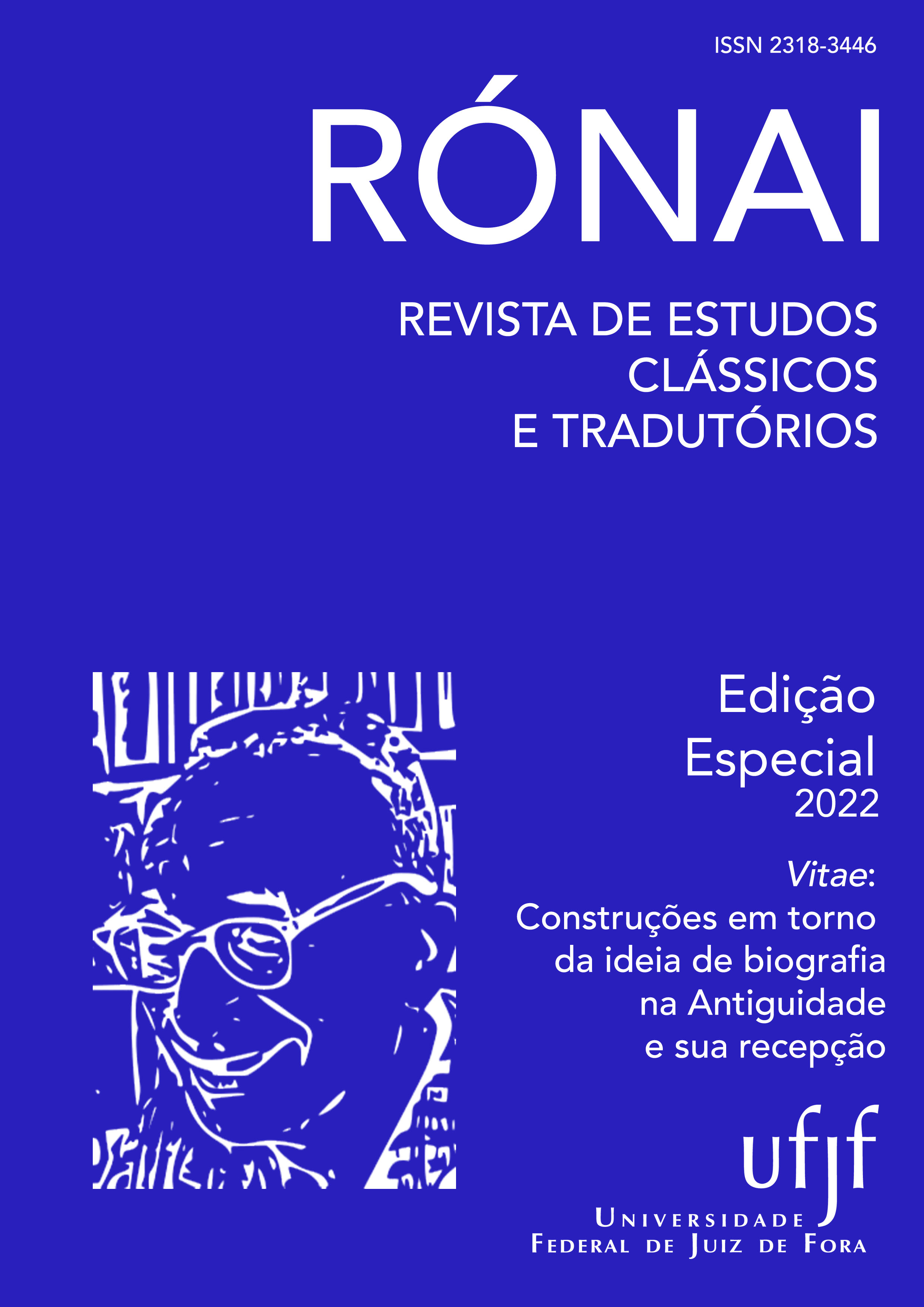Boccaccio and the poetic inclination: Genealogie deorum gentilium 15.10
DOI:
https://doi.org/10.34019/2318-3446.2022.38409Keywords:
Genealogie deorum gentilium, poetry, vocation, autobiography, Giovanni BoccaccioAbstract
In the two final books of the Genealogie deorum gentilium (Genealogies of the pagan gods, ca. 1359-1374), following thirteen encyclopaedic volumes on the Greco-Roman gods and heroes, Giovanni Boccaccio writes a compelling defence of poetry and poets. There, he presents several arguments and examples to rebut his critics (amongst whom were theologians, lawyers and physicians). Particularly in Chapter 10 of Book 15, Boccaccio explains that all humans have different natural dispositions, including a poetic one; and the diversity of studies and professions should be celebrated, not repressed. Then, Boccaccio gives a personal account of his trajectory as a poet, revealing as futile any life project that does not meet one’s own desire. In this paper, I present an original translation of Genealogia 15.10 from Latin into Brazilian Portuguese, accompanied by a brief introduction on Boccaccio’s literary career.
Downloads
References
ARMSTRONG, Guyda; DANIELS, Rhiannon; MILNER, Stephen. Chronology. In: The Cambridge companion to Boccaccio. Cambridge: Cambridge University Press, 2015. p. xxix–xxxv.
ASHDOWNE, Richard; HOWLETT, David; LATHAM, Ronald (eds.). Dictionary of Medieval Latin from British Sources. Oxford: British Academy, 2018.
BAGLIO, Mario. Avidulus glorie: Zanobi da Strada tra Boccaccio e Petrarca. Italia medioevale et umanistica, vol. 54, p. 343-339, 2013.
BLACK, Robert. Humanism and education in medieval and Renaissance Italy: tradition and innovation in Latin schools from the twelfth to the fifteenth century. Cambridge: Cambridge University Press, 2001.
BOCCACCIO, Giovanni. Amorosa visione, ed. Vittore Branca. In: BRANCA, Vittore (ed.). Tutte le opere di Giovanni Boccaccio, vol. 3. Milão: Mondadori, 1974. p. 1-272.
BOCCACCIO, Giovanni. Buccolicum carmen, ed. Giorgio Bernardi Perini. In: BRANCA, Vittore (ed.). Tutte le opere di Giovanni Boccaccio, vol. 5/2. Milão: Mondadori, 1994. p. 689-1085.
BOCCACCIO, Giovanni. Carmina, ed. Giuseppe Velli. In: BRANCA, Vittore (ed.). Tutte le opere di Giovanni Boccaccio, vol. 5/1. Milão: Mondadori, 1992. p. 375-492.
BOCCACCIO, Giovanni. Epistole e lettere, ed. Ginetta Auzzas. In: BRANCA, Vittore (ed.). Tutte le opere di Giovanni Boccaccio, vol. 5/1. Milão: Mondadori, 1992. p. 493-856.
BOCCACCIO, Giovanni. Genealogie deorum gentilium, ed. Vittorio Zaccaria. In: BRANCA, Vittore (ed.). Tutte le opere di Giovanni Boccaccio, vols. 7-8. Milão: Mondadori, 1998.
BOCCACCIO, Giovanni. Trattatello in laude di Dante, ed. Pier Giorgio Ricci. In: BRANCA, Vittore (ed.). Tutte le opere di Giovanni Boccaccio, vol. 3. Milão: Mondadori, 1974. p. 423-538.
BRANCA, Vittore. Giovanni Boccaccio: profilo biografico. Florença: G. C. Sansoni Editore, 1977.
DANIELS, Rhiannon. Reading and meaning: the reception of Boccaccio’s Teseida, Decameron, and De mulieribus claris to 1520. Tese de Doutorado – Department of Italian, University of Leeds, Leeds, 2003.
DE BLASI, Nicola. La prosa. In: BRIOSCHI, Franco; GIROLAMO, Costanzo di (eds.). Manuale di letteratura italiana: storia per generi e problemi, vol. 1. Turim: Bollati Boringhieri Editore, 1993. p. 262-281.
FARIA, Ernesto. Dicionário escolar latino-português. 3 ed. Brasília: Ministério da Educação, 1962.
FONSECA JUNIOR, Adir de Oliveira. Allegory of the self: Boccaccio’s Buccolicum carmen. Tese (Doutorado em Letras Clássicas) – Faculty of Classics, University of Oxford, Oxford, 2021.
FONSECA JUNIOR, Adir de Oliveira. Olympia de Giovanni Boccaccio: gêneros e memória poética virgiliana. Dissertação (Mestrado em Linguística) – Instituto de Estudos da Linguagem, Universidade Estadual de Campinas, Campinas, 2016.
GLARE, P. G. W. Oxford Latin dictionary. 2 ed. Oxford: Oxford University Press, 2012.
HEISE, Pedro Falleiros. Boccaccio e a poesia. Morus, vol. 9, p. 61-70, 2013a.
HEISE, Pedro Falleiros. Boccaccio em defesa da poesia: as Genealogie deorum gentilium. Serafino, v. 5, p. 154-157, 2013b.
HØYRUP, Jens. Jacopo da Firenze’s Tractatus algorismi and early Italian abbacus culture. Basileia; Boston: Birkhäuser, 2007.
JULIANI, Talita Janine. Dido, rainha de Cartago: uma releitura de Giovanni Boccaccio na obra De mulieribus claris. Rónai, vol. 9, n. 2, p. 133-253, 2021.
JULIANI, Talita Janine. Vestígios de Ovídio em Sobre as mulheres famosas (1361-1362) de Giovanni Boccaccio. Tese (Doutorado em Linguística) – Instituto de Estudos da Linguagem, Universidade Estadual de Campinas, Campinas, 2016.
KIRKHAM, Victoria. The parallel lives of Dante and Virgil. Dante Studies, vol. 110, p. 233-253, 1992.
MENETTI, Elisabetta. Boccaccio e a fantasia. Revista de Italianística, vol. 29, p. 109-133, 2015.
NIERMEYER, Jan Frederik. Mediae Latinitatis lexicon minus: lexique latin médiéval-français. Leiden: E. J. Brill, 1976.
PETRARCA, Francesco. Le senili, ed. Guido Martellotti, trans. Giuseppe Fracassetti. Turim: Einaudi, 1976.
TANTURLI, Giuliano; ZAMPONI, Stefano. Biografia e cronologia delle opere. In: DE ROBERTIS, Teresa et al. (ed.). Boccaccio autore e copista. Firenze: Mandragora, 2013. p. 61-66.
WILSON-OKAMURA, David Scott. Virgil in the Renaissance. Cambridge: Cambridge University Press, 2010.
WITT, Ronald. In the footsteps of the ancients: the origins of humanism from Lovato to Bruni. Leiden: Brill, 2000.
ZAK, Gur. Petrarch’s humanism and the care of the self. Cambridge; Nova Iorque: Cambridge University Press, 2010.
ZIOLKOWSKI, Jan; PUTNAM, Michael. The Virgilian tradition: the first fifteen hundred years. New Haven: Yale University Press, 2008.
Downloads
Published
How to Cite
Issue
Section
License
Copyright (c) 2022 Adir de Oliveira Fonseca Junior

This work is licensed under a Creative Commons Attribution 4.0 International License.
Copyright
The authors of the published contributions agree with the following items:
1. The authors keep the copyright and convey to the journal the right of first publication, the work being licensed under a Creative Commons Attribution License 4.0 International.
2. The authors are allowed and stimulated to publicize and distribute their work online after the publication in the journal, recognizing first publication in this journal.
3. The authors of the approved works authorize the journal to distribute their content, after publication, for reproduction in content indexes, virtual libraries and similars.
For more information about Creative Commons Attribution License 4.0 International, please, go to: https://creativecommons.org/licenses/by/4.0/deed.en
Editorial exemption
The authors of the published contributions are entirely and exclusively responsible for their contents. Its content does not represent an official position of Rónai - Revista de Estudos Clássicos e Tradutórios neither of Faculdade de Letras da Universidade Federal de Juiz de Fora or their partner institutions.



